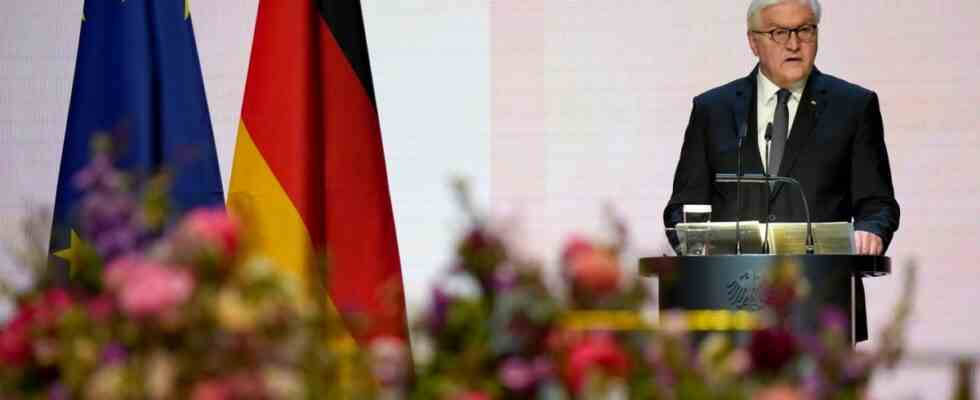It took a long time, but now the time has come. Frank-Walter Steinmeier wants to give his big speech to the nation this Friday. It’s supposed to start at eleven o’clock in Bellevue Palace. Not only politicians of all stripes – from Ricarda Lang to Friedrich Merz – will sit in the audience, but also many “normal” citizens. “Strengthening everything that connects us” will be the motto of the speech, we already know that much.
The Federal President wants to address two issues in particular: Russia’s war against Ukraine and climate change. He wants to talk about what the consequences of this should be for society in this country. And he wants to give confidence. The ARD will interrupt its originally planned program for the Steinmeier speech, and other broadcasters are also planning special programs. So the fall for the Federal President will be high: can he meet the expectations he has raised?
As Federal President, Steinmeier has already given an enormous number of speeches, in his first term alone there were a good 650. But hardly any of them have been remembered. Impressive performances such as when he was re-elected in February, at the 100th anniversary of the German Republic or at Yad Vashem and in the Bundestag on the 75th anniversary of the liberation of Auschwitz remained the exception. In contrast to his predecessor Joachim Gauck, Steinmeier has so far not run the risk of being celebrated for his oratory skills.
He has been talking about the “epoch break” since May
There are complaints that his speeches have so far attracted more attention than class. And that because he too often wants to please too many, he is often not specific enough. That rankles Steinmeier. And he wants to change that. In February he got Marc Brost from the time brought into the office of the President as a speechwriter. Brost wrote the speech that Steinmeier will give this Friday.
In recent months, however, the Federal President has already become much clearer himself. At the plenary assembly of the World Council of Churches in Karlsruhe, he sharply criticized the leaders of the Russian Orthodox Church. Steinmeier accused them of leading believers “on a terrible, even anti-religious, blasphemous wrong path”. By supporting the Russian war of aggression, they would “arbitrarily claim God’s will for the imperial dreams of a dictatorship”.
And when many haven’t yet seen the enormous problems at the Documenta, the Federal President has already made it clear with regard to the organizers and the Indonesian curatorial collective: “Nobody who wants to be taken seriously as a debate participant in Germany can speak to Israel, but to six million murdered Jews are silent.”
Steinmeier was part of the problem
But Steinmeier hasn’t heard too much concrete about the consequences that German citizens should draw from the Russian war of aggression and climate change. Since May, the Federal President has been talking about an “epochal break” that has “challenged or already swept away” many of the certainties of the last few decades. However, he has not yet spelled out what that means. He wants to do that now.
It won’t be easy for him. When it comes to climate change and Russia policy, Steinmeier himself was part of the problem in the past. As Angela Merkel’s foreign minister and Gerhard Schröder’s head of the chancellery, he shared responsibility for Germany’s dealings with Russia for almost 15 years – and thus also for the many mistakes in dealing with Vladimir Putin. During this time, he was not noticed as a particularly effective champion of climate protection.
And so this Friday will also be interesting to see whether Steinmeier will practice self-criticism. Or whether he – also to avoid them – will primarily look ahead.

